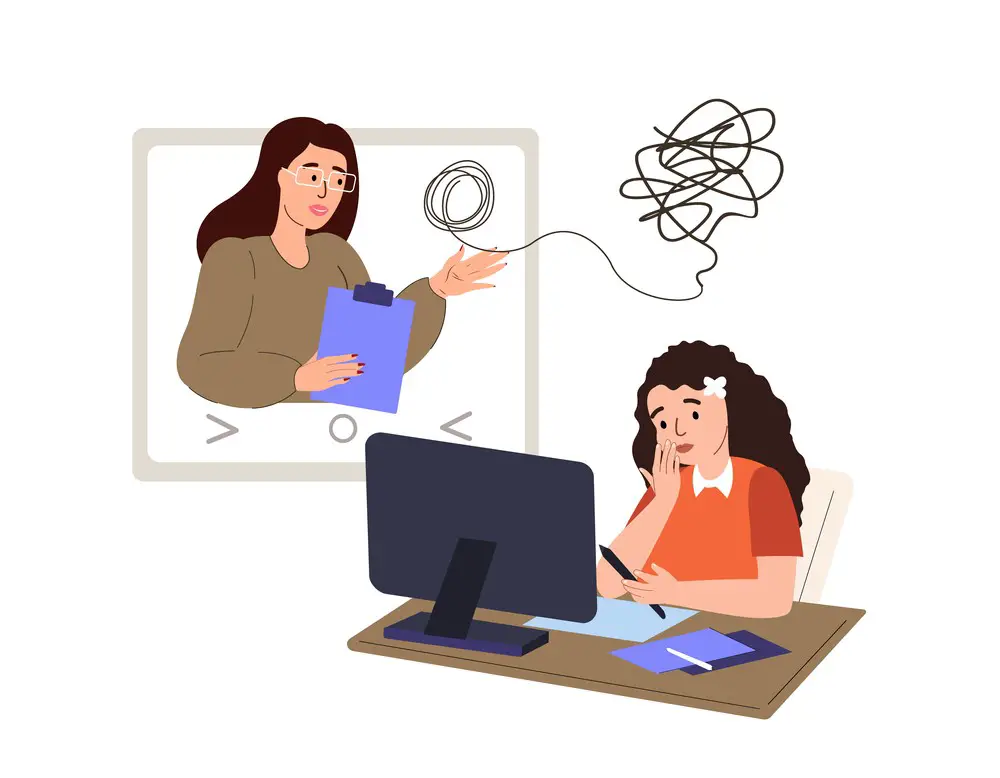As a BetterHelp affiliate, we receive compensation from BetterHelp if you purchase products or services through the links provided
Therapy insights provide valuable information and understanding of mental health treatment. As society shifts toward a more comprehensive approach to mental and emotional wellness, comprehending the various aspects of therapy can empower individuals seeking help and support.
Delving into therapeutic techniques and approaches, the role of therapists, specialized therapies, and available resources can be essential for personal growth and healing. Understanding how to navigate therapy services, addressing common challenges, and answering frequently asked questions enrich the therapy journey for those affected by mental health conditions.
Key Takeaways
- Gaining insights into therapy can empower individuals seeking mental health support.
- Various approaches and resources exist for personal growth and healing in therapy.
- Navigating therapy services and overcoming challenges leads to a more successful therapeutic journey.

Understanding Therapy
In therapy, individuals seek help improving their well-being, relationships, and emotions. It primarily involves communication between a therapist and a client to understand better the individual’s thoughts, behaviors, and experiences.
Therapy Types
There are several types of therapy available to suit different needs. Two common approaches are cognitive behavioral therapy (CBT) and psychodynamic therapy.
Cognitive Behavioral Therapy (CBT) focuses on recognizing and changing negative thought patterns and behaviors. The approach involves:
- Identifying irrational thoughts
- Challenging them
- Developing positive coping strategies
Psychodynamic Therapy aims to uncover underlying unconscious conflicts and feelings that may be linked to past experiences or trauma. Key aspects of this therapy style include:
- Exploring childhood experiences
- Examining Relationships with Caregivers
- Uncovering unconscious motivations

Therapy Goals
Some of the main goals of therapy include improving communication, increasing self-awareness, and strengthening relationships. Achieving these aims may involve:
- Addressing emotional concerns
- Managing stress or anxiety
- Resolving conflicts within relationships
- Enhancing coping skills in Response to Trauma
Therapy can help individuals better understand their emotions, practices, and thought patterns, providing them with tools to lead healthier and more fulfilling lives.
Mental Health Conditions
Anxiety and Depression
Mental health conditions, such as anxiety and depression, can affect people of all ages. Anxiety disorders are characterized by persistent, excessive worry and fear, while depression is marked by sadness, hopelessness, and a lack of interest in activities. Clients with these conditions often benefit from therapy, medication, and lifestyle changes.
Eating Disorders
Eating disorders, including anorexia nervosa, bulimia nervosa, and binge eating disorder, are serious mental health conditions that affect a person’s relationship with food and body image. These disorders can severely affect a person’s physical and emotional health. Treatment typically involves addressing the psychosocial factors contributing to the disorder and may include individual therapy, nutrition counseling, and support groups.
Post-Traumatic Stress Disorder
Post-traumatic stress disorder (PTSD) is a mental health condition that can develop following exposure to a traumatic event. Symptoms of PTSD include flashbacks, nightmares, and heightened emotional reactivity to reminders of the trauma. Treatment for PTSD may involve trauma-focused therapies, such as cognitive processing therapy or eye movement desensitization and reprocessing (EMDR), to help clients process their traumatic experiences and reduce symptoms.
Childhood Conditions
Children and teenagers can also be affected by various mental health conditions. Common childhood conditions include attention deficit hyperactivity disorder (ADHD), autism spectrum disorder (ASD), and oppositional defiant disorder (ODD). Early intervention and appropriate treatment, such as behavioral therapy and, in some cases, medication, can help support these young clients in managing their symptoms and achieving improved mental health.
Role of Therapists
Therapists come in various forms to cater to individuals’ diverse mental health needs. They are crucial in identifying, diagnosing, and treating mental health issues. This section focuses on the roles of Psychiatrists, Psychologists, Social Workers, and Marriage and Family Therapists.
Psychiatrists
Psychiatrists are medical doctors who specialize in diagnosing and treating mental health disorders. They can prescribe medication and offer talk therapy when appropriate. Some of the key responsibilities of psychiatrists include:
- Assessing and diagnosing mental health conditions
- Developing individualized treatment plans
- Monitoring medication effectiveness and adjusting dosages when necessary
Psychologists
Unlike psychiatrists, psychologists are not medical doctors and do not prescribe medication. They primarily use talk therapy to help individuals manage their mental health issues. Some roles performed by psychologists include:
- Conducting psychological assessments and tests
- Creating therapy plans based on individual needs
- Guiding to help clients navigate challenging situations
Social Workers
Social workers address mental health needs with a broader perspective by considering environmental and societal factors that may contribute to an individual’s mental health challenges. They offer support to ensure that clients can access necessary resources. The key roles of social workers involve the following:
- Assessing and evaluating clients’ needs
- Connecting clients to appropriate resources and support services
- Providing direct therapy and counseling services
Marriage and Family Therapists
Marriage and Family Therapists (MFTs) address relational issues affecting couples and families. They facilitate productive communication and help clients develop strategies to strengthen their relationships. MFTs perform the following tasks:
- Assessing interpersonal and family dynamics
- Designing treatment plans to address relational issues
- Guiding clients to develop effective communication skills

Therapy Techniques and Approaches
Insight Therapy
Insight therapy aims to increase self-awareness and help individuals understand their feelings, thoughts, and emotions. It focuses on exploring the underlying causes of various psychological issues. This approach is often applied in talk therapy, where therapists encourage clients to express their experiences, emotions, and thoughts openly, allowing them to gain valuable insights into their behavior and mental processes.
Dream Interpretation
Dream interpretation is an approach where therapists work with clients to analyze the symbolism and themes within their dreams. These interpretations serve as a gateway to accessing unconscious thoughts and emotions. Dreams often contain suppressed feelings, thoughts, or memories that could provide essential insights into the client’s mental state. This approach believes decoding these symbolic representations can reveal valuable information about an individual’s psychological well-being.
Psychoanalysis
Psychoanalysis, founded by Sigmund Freud, is a therapy approach that seeks to uncover unconscious thoughts, desires, and emotions. Its techniques include free association, where clients share all thoughts that come to mind without censorship. Additionally, psychoanalysts might use transference, observing the emotional reactions and feelings clients project onto the therapist. This helps them understand unresolved conflicts from their past, ultimately leading to a deeper understanding of themselves and improved mental health.
Specialized Therapies
ALS and Aging-Related Therapy
Specific treatments exist for individuals with Amyotrophic Lateral Sclerosis (ALS) and aging-related issues. Research has shown that physical therapy (PT) is vital in managing symptoms and improving the quality of life for ALS patients. PT interventions can help address muscle weakness, pain, and mobility limitations.
People may experience conditions like stroke, aphasia, and brain injury as they age. Therapies for these aging-related concerns often focus on restoring cognitive and physical functioning and managing symptoms. Treatments for dysphagia, common in ALS and aging populations, can include exercises to strengthen swallowing muscles and strategies to prevent aspiration.
Pediatric and Adult SLP
Speech-language pathology (SLP) is a specialized therapy targeting communication and swallowing disorders. Pediatric SLPs work with children experiencing issues such as:
- Autism
- Feeding and swallowing difficulties
- Speech and language delays
Adult SLPs address diverse conditions, including:
- Aphasia
- Dysphagia
- Head and neck cancer
- Chronic pain
Both pediatric and adult SLPs utilize evidence-based therapies to help patients improve communication, language, and swallowing skills.
Occupational Therapy
Occupational therapy (OT) is a holistic approach that assists people in achieving their functional goals after health conditions or injuries. OT practitioners work with individuals experiencing a range of concerns, such as:
- Stroke
- Spinal cord injury
- Brain injury
- Chronic pain
Occupational therapists use therapeutic activities and strategies to help their clients regain independence in daily tasks. Their interventions may include cognitive and physical rehabilitation, adaptive equipment recommendations, and environmental modifications, all to promote functional recovery and enhanced quality of life.

Counseling and Coaching
Life Choices and Improvement
Counseling and coaching are both beneficial in helping individuals make positive changes in their lives. They can assist individuals in overcoming grief, identifying patterns of behavior, and improving relationships. Both approaches focus on helping individuals align with their values and achieve greater motivation.
Counselors often work with clients to explore underlying emotions and address personal struggles. They provide support and guidance in a safe, non-judgmental environment. Conversely, coaching focuses on setting and achieving specific goals, often related to personal growth and development.
Boundaries and Communication
Establishing healthy boundaries is crucial to maintaining strong relationships and personal well-being. Counseling and coaching both help individuals identify and enforce appropriate boundaries with others. This includes learning to say no, protecting one’s personal space, and respecting the boundaries of others.
Effective communication skills are also essential in nurturing relationships and promoting positive change. Counselors and coaches often teach clients active listening, assertiveness, and conflict-resolution techniques. By enhancing these skills, individuals can better express their needs and feelings while fostering stronger connections.
Therapy Resources and Tools
Evaluating Tools
When searching for therapy materials, evaluating tools and resources is essential to ensure their effectiveness and appropriateness for the patient. This can include comparing various eval tools for their relevance in assessing specific needs or conditions, such as occupational therapy and speech therapy. Evaluating a tool’s efficacy and credibility can help create a personalized and effective treatment plan.
Printables and Handouts
Printables and handouts are valuable resources for therapists and patients in therapy sessions and at-home practice. They can cover various topics, such as coping skills, goal-setting, and communication techniques. These materials can be easily customized to suit the individual needs of each patient, providing a custom access pass to therapeutic support.
- Coping Worksheets: Provide patients with strategies for managing stress, anxiety, and negative emotions.
- Goal-setting Templates: Help patients create a roadmap for their therapy journey, setting achievable and meaningful goals.
- Communication Techniques: Give patients tools to improve their interpersonal skills, particularly in speech therapy sessions.
Clinical References
Clinical references are essential resources that therapists can consult to gain a deeper understanding of various therapeutic approaches, emerging research, and commonly used techniques. These materials, such as books, journal articles, and databases, offer knowledge to inform and guide therapists throughout their practice.
- Occupational Therapy: Resources may focus on techniques for improving fine motor skills, sensory processing, and activities of daily living.
- Speech Therapy: References may provide insights into speech disorders, language development, and articulation exercises.
Moreover, therapists can stay updated and informed through podcasts and online platforms like the Resource Roadmap Show, which provides valuable information on new tools and resources in the field.
Navigating Therapy Services
Acquiring Appointments
One key aspect of navigating therapy services is acquiring appointments with healthcare providers. Planning and seeking out providers that match your specific needs and preferences is essential. Many individuals with past experiences of low self-esteem or other challenges may find this process daunting; however, being proactive and organized can make a significant difference.
Tips for scheduling appointments:
- Research various healthcare providers to find the best fit
- Keep track of preferred appointment times and dates in a calendar
- Be prepared to discuss your needs and concerns with the provider
- Stay open to scheduling adjustments if necessary
Relationship with Healthcare Providers
Developing a strong relationship with your healthcare provider is crucial for successful therapy. Communication is key – discussing goals, expectations, and progress openly with your provider ensures a tailored treatment plan. Building trust and establishing a secure bond allows for a more comfortable therapeutic experience.
Consider the following when fostering relationships with healthcare providers:
- Share openly about your past experiences and challenges
- Remain engaged and active in your treatment process
- Give candid feedback to your provider and seek clarification when needed
- Attend any relevant continuing education units (CEUs) or workshops to enhance your understanding
Individuals can navigate therapy services by proactively acquiring appointments and nurturing relationships with healthcare providers. Remember to prioritize your needs and effectively communicate with providers to ensure a positive therapeutic journey.
Challenges in Therapy
Feelings of Uncertainty
It is common for individuals entering therapy to feel nervous and unsure. This is often due to a lack of understanding about the process and the different beliefs and experiences they bring. Many people may have preconceived notions about therapy which can create feelings of uncertainty. Therapists must address these concerns by explaining the process and setting clear expectations.
During the first few sessions, therapists will often work on establishing a trusting and safe environment. Clients may be encouraged to share their concerns and expectations openly. This can help them understand the nature of therapy and reduce their feelings of uncertainty.
Stigma Associated with Therapy
Despite the growing awareness about mental health, the stigma surrounding therapy persists. Negative attitudes and beliefs about seeking professional help can deter people from accessing the support they need. This can lead to individuals feeling ashamed, isolated, or judged.
To combat the stigma associated with therapy, mental health professionals must educate the public about the benefits of therapy. This can include sharing success stories, promoting awareness campaigns, and addressing misconceptions. In addition, therapists must work towards creating a culturally-sensitive and inclusive setting so clients from diverse backgrounds feel welcomed and understood.
Public figures openly discussing their therapy experiences can also help break down barriers and encourage others to seek help when needed. This normalization of therapy can contribute to dismantling the stigma associated with therapy and make it easier for individuals to seek support in times of need.
Frequently Asked Questions
What are common therapy methods?
Several common therapy methods include Cognitive Behavioral Therapy (CBT), Psychodynamic Therapy, Humanistic Therapy, and Dialectical Behavior Therapy (DBT). Each method has unique approaches and techniques for addressing various mental health issues.
How to find a reliable therapist?
One can ask friends, family, and healthcare professionals for recommendations to find a reliable therapist. Additionally, online directories and professional organizations can provide information on therapists in the local area. Verifying the therapist’s qualifications, experience, and specialization is important before deciding.
What is the cost of therapy?
The cost of therapy varies depending on location, therapist’s experience, and duration of sessions. Generally, individual therapy sessions can range from $50 to $200 per hour. Some therapists offer a sliding scale or payment plans to accommodate different financial situations.
Are there any free therapy resources?
Yes, there are free therapy resources available. Some options include support groups, community mental health clinics, and crisis hotlines. Additionally, many universities and training institutions offer free or low-cost therapy provided by supervised graduate students.
How to choose a suitable therapy practice?
One should consider factors such as the therapist’s experience, approach, and specialization to choose a suitable therapy practice. It is crucial to feel comfortable with the therapist and have a good rapport, as this will promote open communication and support the therapeutic process.
What benefits do therapy podcasts provide?
Therapy podcasts can provide informational content, insights, and tips on various mental health topics. They may feature interviews with experts or share personal experiences. While not a substitute for professional therapy, podcasts can be a valuable resource for increasing mental health awareness and self-care strategies.
This site contains affiliate links to products. We will receive a commission for purchases made through these links.



